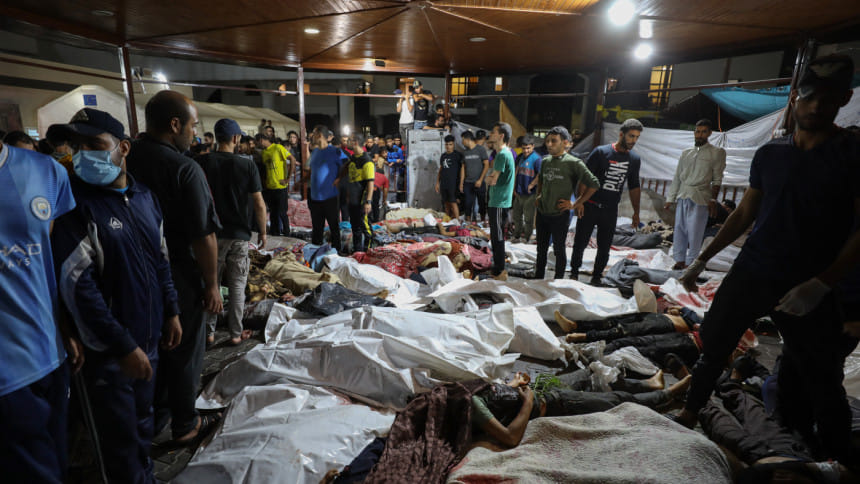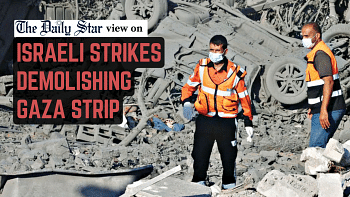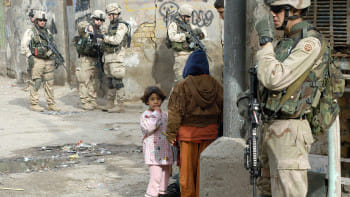Israel’s hubris will be its undoing

The death toll from Israel's incessant attacks on Gaza has crossed 4,200, including more than 1,000 children. Israel has crossed all red lines in the ferocity, depravity and savagery of its disproportionate retribution for Operation Al-Aqsa Flood by Hamas on October 7, paying little heed to the laws of war, sparing neither children nor the sick, and even using the banned white phosphorus bombs during attacks on the densely populated Gaza Strip. About half of Palestine's two million-plus population has been internally displaced since the launch of Israel's Operation Iron Swords.
The October 17 Israeli airstrike on the al-Ahli Arab Hospital killed more than 500 civilians. While Israel tried to put the blame on Islamic Jihad "misfiring," after the attack, Israeli Prime Minister Benjamin Netanyahu's digital aide Hananya Naftali boasted on X (formerly Twitter), "Israeli Air Force struck a Hamas terrorist base inside a hospital in Gaza." While he later deleted the post and claimed he had shared the post based on a Reuters report, it was too late. Later, the Israel Defense Forces (IDF) shared a video footage allegedly shot 40 minutes after the attack, which was also removed later. Unsurprisingly, the al-Ahli hospital is not the first health facility to have been attacked by Israel, despite US President Joe Biden and Israel shamelessly putting the blame on "the other team."
Merely 26 hours after the bombing of al-Ahli hospital, Israeli airstrikes hit a building outside of al-Quds Hospital in Gaza, only three kilometres away from al-Ahli, Al Jazeera reported.
The internally displaced have no escape either. Egypt, already reeling from high inflation and mounting internal pressures (with its December presidential elections looming), has little political will or opportunity to shelter new refugees. With Israel constantly bombing the Rafah crossing into Egypt, there is no opportunity for Palestinians to cross over to the other side.
Similarly, Lebanon, Jordan and Syria – some of the historically supportive host countries for Palestinian refugees – are fighting their own economic and sociopolitical challenges, and are unable to open their doors for more. Jordan, which shares a border with the Israeli-occupied West Bank, has warned against the forced displacement of Palestinians. Gaza residents are literally imprisoned by Israel in the tiny, besieged strip, waiting for the next bomb to claim their lives.
While the humanitarian aspect of the Israeli attacks on Gaza is heart-wrenching, there is also a geopolitical side to consider. Hamas was fully aware of the inadequacy of its military capability vis-a-vis Israel's capability. So, what was Hamas' objective behind Operation Al-Aqsa Flood?
One general assumption among political experts in the Middle East is that Hamas wanted to reassert the unresolved Palestinian cause, which had lost relevance amid the recent fast-paced political developments taking place in the Arab world.
Two of the major developments were the China-mediated normalisation of ties between Saudi Arabia and Hamas ally Iran, and the potential normalisation of a relationship between Saudi Arabia and Israel. Saudi Arabia, wanting to assume a leadership role in the turbulent region, was warming up to the idea of normalising ties with Israel. Had this come to fruition, it would have brought Israel the legitimacy and recognition it needed from the Arab world to carry out the silent ethnic cleansing of Palestinians.
The increasing ferocity of Israeli attacks will only garner further support for Palestine. Not that Israel cares, but the US and other allies are now being questioned for being complicit in war crimes, and for aiding and abetting crimes against humanity. The US is already being called out for being a war criminal by extension, sending warships and arsenal in support of Israel, and for providing military aid to the rogue state in billions of dollars.
Already, the Netanyahu regime has provoked illegal Israeli settlers to burn Palestinian villages and encroach the land. However, since these incidents are small-scale, although regular, they would not have posed a moral obstacle for the Saudis to go ahead with the US-brokered deal. But with Israel now carrying out one of the bloodiest massacres on Palestinian civilians in decades, Saudi Arabia has shelved the normalisation proposal while engaging with Iran to de-escalate the situation.
Similarly, countries who have normalised ties with Israel, including Bahrain, the UAE and Morocco, are now having to craft new narratives to justify their actions to their respective infuriated populations. As Israel intensifies its attacks on Gaza and the wider ramifications of the massacre start to unfold, these signatories to the Abraham Accords will find it increasingly difficult to maintain their balancing act.
Like all previous US-crafted, pro-Israel "peace initiatives," the Abraham Accords are flawed at their core: with the Palestine issue unresolved, there can be no peace between Israel and the Arab world. No matter how the US and Israel try to convince or coerce the Arab nations to recognise the rogue state's legitimacy, there is no way popular Arab opinion will sway in Israel's favour. The Abraham Accords run the risk of falling apart just like the Oslo peace process did in 2000, with recrimination for all sides.
Israel's eyesore Iran, while currently not in the best position to participate in the conflict as a proactive player, cannot sit idle if Israel does not hold its horses. Iran has already stated that it will not be a bystander if Israel does not stop killing innocent Palestinians. These might be mere words, but Sunni-dominated Saudis and Shia-dominated Iran coming together for the Palestinian cause is a unique failure of the Western Middle East policy.
On the other hand, Hamas ally Hezbollah has already opened an attacking second front by striking projectiles inside northern Israeli territory. Israel is returning the courtesy through similar means, with tensions escalating every day.
The genocide in Gaza is also having a negative impact on the occupied West Bank, where public resentment against Israel is increasing. And thanks to Israel making a puppet out of the Palestinian National Authority, the latter is unable to assure the residents of West Bank of security or stop Israel from killing more civilians.
The increasing ferocity of Israeli attacks will only garner further support for Palestine. Not that Israel cares, but the US and other allies are now being questioned for being complicit in war crimes, and for aiding and abetting crimes against humanity. The US is already being called out for being a war criminal by extension, sending warships and arsenal in support of Israel, and for providing military aid to the rogue state in billions of dollars. With elections coming up in November 2024, the timing could not have been worse for the Biden administration.
Operation Al-Aqsa Flood seems to have overturned the West's plan for integration of Israel into the Arab fold. The map that Netanyahu presented at this year's UN General Assembly, of a new Middle East (minus Palestine), is unlikely to materialise anytime soon.
The fruitless Middle East trip by US Secretary of State Antony Blinken and Secretary of Defense Lloyd J Austin III – who could neither secure the release of Israeli hostages from Hamas nor de-escalate the situation in Gaza – is a testament to the waning influence of the US in the region. To salvage the situation, Biden also made a hurried trip to Israel and Jordan and failed to both de-escalate the situation or meet the Arab players from Palestine, Jordan and Egypt, with a planned summit being cancelled in the aftermath of the al-Ahli Arab Hospital attack. Now, UK Prime Minister Rishi Sunak and French President Emmanuel Macron are scheduled to visit Israel to salvage the discussion.
The US' democratic values are being questioned. The country lost its moral high ground as a world leader for openly supporting the genocide in Gaza when it vetoed a UN resolution for humanitarian pause on Israeli attacks in Gaza.
Operation Al-Aqsa Flood seems to have overturned the West's plan for integration of Israel into the Arab fold. The map that Netanyahu presented at this year's UN General Assembly, of a new Middle East (minus Palestine), is unlikely to materialise anytime soon.
As of now, Israel has two options. The first is a protracted urban insurgency on at least three fronts: Gaza, West Bank, and the border with Lebanon. Though its forces are well-trained, they may not be able to fight well, given that most Israeli military operations in recent years have been one-sided attacks against mainly civilians. The second option for Israel would be agreeing to a ceasefire under international and US pressure, as the latter may try to save its own face now, given that its historic failure in Iraq is still fresh in the collective memory of the region. This would severely dent the already crumbling internal acceptance of the Netanyahu regime, and perhaps signal the end of the rogue leader's political career.
Both these options will only bring woes for Israel and crush any of its fading hopes or aspirations for acceptance among the Arab nations. Israel is and will always remain a pariah, a rogue state, an apartheid regime. It had better have a respectable exit plan from this bloody mess of its own creation.
Tasneem Tayeb is a columnist for The Daily Star. Her X handle is @tasneem_tayeb
Views expressed in the article are the author's own.
Follow The Daily Star Opinion on Facebook for the latest opinions, commentaries and analyses by experts and professionals. To contribute your article or letter to The Daily Star Opinion, see our guidelines for submission.

 For all latest news, follow The Daily Star's Google News channel.
For all latest news, follow The Daily Star's Google News channel. 













Comments